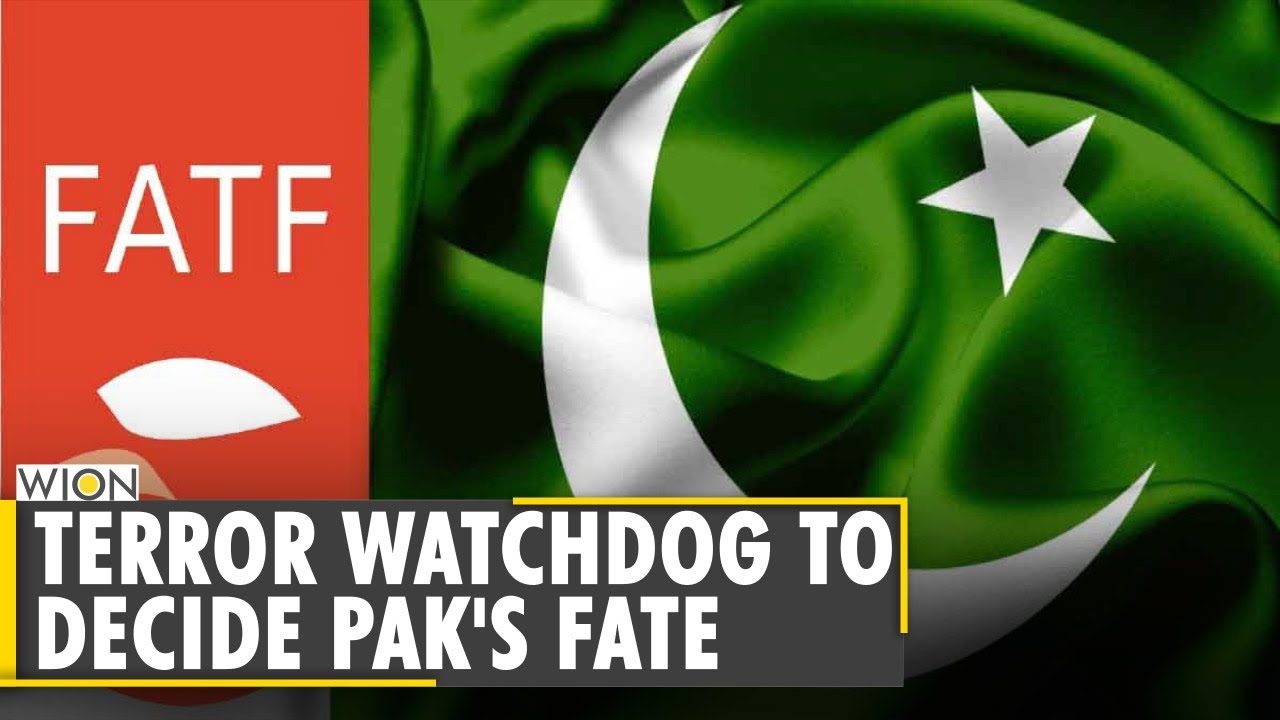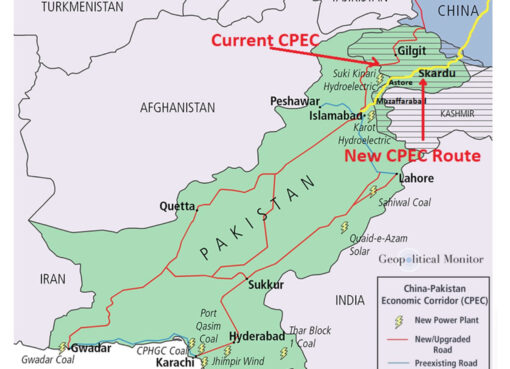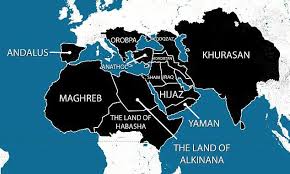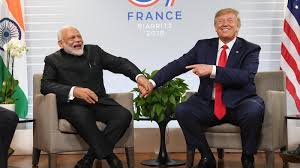FATF plenary meeting must be aware of the fact that many of the arrested terrorists, like Hafiz ul Saeed, and Sajid Mir and those in hiding like Masood Azhar will come out into the public as soon as Pakistan was taken off the gray list. It is, therefore, best advised to create a mechanism for an auto-gray listing of Pakistan for violation of any agreed principles
by Prasad Nallapati
Pakistan is confident that it will get off the ‘Gray List’ of the Financial Action Task Force (FATF) in its two-day plenary meeting starting in Paris from today. It was put on the list in June 2018 for serious lacunae in its handling of money laundering and terrorist financing.
Its plenary in Berlin in June this year made an initial determination that “Pakistan has substantially completed its two action plans and warrants an on-site visit to verify the implementation of the promised reforms.” A 15-member FATF’s team, comprising officials from the US, UK, EU and others, visited Pakistan from August 29 to September 2. Its onsite report will be discussed in the current plenary session before a final decision is taken.
If FATF really concludes that Pakistan has fulfilled all measures for Anti-Money Laundering and Combating Financing of Terrorism (AML-CFT), the question to be examined is whether such a conclusion is based on ground realities or a result of Islamabad’s usual tactics to charm the gullible US and European administrations.
Pakistan’s Reluctance to Prosecute Terrorists
One of the major stumbling blocks that has so far prevented Pakistan’s release from the list was its inability to prosecute individuals accused of terror financing.
A bizarre case is that of the UN-designated Masood Azhar, who founded the terrorist group, Jaish-e-Mohammed (JeM), after his release from an Indian prison in exchange for a hijacked plane in 1999. As FATF demands grew for action against him, he was conveniently removed from his vast palatial base in Bahawalpur in southern Punjab to a hide out.
Azhar seems to be more vital to the Pakistan army for its operations against India than even Hafiz ul Saeed of Lashkar-e-Taiba (LeT). The latter, who is carrying a US bounty of $ 10 million for his role in Mumbai terrorist attack, was sentenced for 32 years in jail, while his co-accused, Sajid Mir, was convicted only a few days before the Berlin plenary.
Pakistan is applying all tricks to deflect attention from Azhar. Its Ministry of Foreign Affairs stated on September 14 that it had written a letter to Taliban administration to locate and arrest Azhar, who it said is likely to be in the Nangarhar or Kunar areas of Afghanistan. Kabul has hit back saying that he is a Pakistan-based terrorist. Its spokesperson, Zabiullah Mujahid, and Taliban’s head of political office in Doha and UN ambassador-designate, Suhail Shaheen, warned Pakistan to refrain from making allegations without any proof and such claims can adversely affect bilateral ties.
Pakistan’s Efforts to re-entice US for FATF and Economic Relief
Pakistan’s diplomatic blitzkrieg in New York, on the backdrop of UN General Assembly session, and in Washington DC had its focus on playing `victimhood’ on account of the unprecedented floods that inundated vast areas of the country, precarious economic conditions and increased terrorist attacks emanating from Taliban-led Afghanistan. Islamabad’s oft repeated negotiating tactic that “a failing Pakistan is no less a threat to U.S. interests than a successful Pakistan was an asset to American diplomacy,” found new takers in the Biden administration.
A well-crafted narrative made out that the massive floods was not due to any mismanagement of Pakistani administrations, but a result of mistakes made by big countries that have caused climate change which also affected the Muslim state. Being a victim of others’ mistakes, they need to make good of its financial losses. The UN member states, led by the US, have pledged over $ 180 million far exceeding Pakistan’s initial appeal, which is now revised upward to $ 816 million.
Floods in Pakistan are a common phenomenon. The July 2010 floods, considered to be the worst ever natural disaster, also affected the whole country resulting in the death of over 2000 people. Pakistan had made a similar plea for disaster aid and American officials were in the vanguard of the money-raising effort, expecting a public relations payoff, according to the book, `How Pakistan Negotiates with the United States’, written by former US Ambassadors to Pakistan, Howard and Teresita Schaffer.
In his foreword to the book, late Stephen P. Cohen, a well-known strategic expert on South Asia, stated “Six months after the initial floods, the American aid effort was a case of too much too late, as the damage to Pakistan was in large part the cumulative consequence of years of neglect of the country’s irrigation and flood control infrastructure.” The situation has not changed much since 2010 with the country witnessing recurring floods.
US Takes bait to Pakistan Playing a Terror Victim
Pakistan has begun accusing the Afghan Taliban of its unwillingness to address Islamabad’s concerns of the use of its soil for terrorist attacks against Pakistan. This narrative appeals to the US and European countries which have also been accusing the Taliban of not acting against foreign terrorist groups, like Al-Qaida, as was agreed. Pakistan’s help in leading the US to kill AQ leader, Ayman al-Zawahiri, in Kabul is a master stroke that catapulted Islamabad to re-emerge as an asset in the fight against terrorism, while projecting itself a victim and Taliban a perpetrator of terrorism.
Pakistan is getting a helping hand from Tehrik-i-Taliban Pakistan (TTP), also known as Pakistani Taliban, in its projection of being a terrorist victim. Past Army operations to clean up Waziristan of terrorist groups forced TTP to evacuate to Afghanistan. Successive governments have tried to negotiate a peace deal with them without much success. In fact, the current Prime Minister Shahbaz Sharif had held several meetings with the TTP when he was Chief Minister of Punjab and requested them to spare his state. The latest rounds of negotiations were held in Kabul, but no details were ever given out.
There was a sudden upsurge in terrorist attacks by the TTP in Swat in Khyber Pakhtunkhwa province and in Gilgit-Baltistan region in the past few months. Local people raised in protests across the region questioning the Army how the TTP men have now resurfaced in Swat and other adjoining tribal districts and who allowed them without a formal deal had been reached. It is believed that some TTP members were allowed to come back as a goodwill gesture and confidence building measure. The group also claimed killing a security official in Lahore earlier this month indicating a free run. This limited and controlled terrorist violence may have its own reasons and purpose.
The Chief of the Army Staff, Gen.Qamar Javed Bajwa reached out to Deputy Secretary of State Wendy Sherman on July 29 and the US drones could lock in on to its AQ target two days later. Within a month, the IMF has released a tranche of $ 1.2 billion to help Pakistan out of its precarious financial condition. The Biden administration has also approved a $ 450 million for F-16 fighter fleet sustainment program for Pakistan’s so-called counterterrorism measures. The US is believed to have played a key role in ensuring the FATF’s onsite visit to Pakistan for its eventual release from the gray list.
Current Incoherence in Biden Administration gives advantage to Pakistan
The current incoherence of Biden’s administration appears to be aiding Pakistan and its friends in the US to take advantage. With no clear policy guidelines from top political leadership, the mid and lower-level foreign policy officials, who have insufficient knowledge of Subcontinental intricacies, seem to be freelancing and hence are easily gullible to promises that are attractively packaged and sold. The visit of US Ambassador in Pakistan to its occupied Kashmir (PoK) to assert that it was a legitimate region of the country is part of such short-sighted policies.
The subsequent assertion by President Biden that Pakistan is one of the most dangerous nations in the world and its nuclear weapons are without cohesion makes the record clear. It’s not just off-the-cuff remark as he was reading from a prompter and hence must be based on intelligence assessments. A. Q. Khan’s covert nuclear proliferation to Iran, Libya, North Korea etc., has not been forgotten, nor an Al-Qaida attack on Pakistani frigate, PNS Zulfiquar, targeting a nuclear warhead on board the vessel. Seve Coll has written an account of the attack in his book, “Directorate S: The C.I.A. and America’s Secret Wars in Afghanistan and Pakistan.”
FATF needs to create Mechanism for Auto-Gray Listing for violation of agreed Principles
Pakistan’s “revolving door” policy of dealing with wanted terrorist leaders has been well known. Many terrorist elements were put in state guest houses, temporarily showing them as jails, when the international heat was on and were released after pressure lifted. Washington’s sudden show of love for Pakistan after Zawahiri was handed over on a plotter shows its easy gullibility. Has it forgotten Pakistan’s sheltering of Osama bin Laden next to a garrison while feigning no knowledge of his whereabouts, until he was found and killed in an US operation. Zawahiri was also actually living in Pakistan and was obviously shifted to Kabul after Taliban came to power. Pakistan Army had always known Zawahiri’s whereabouts.
FATF plenary meeting must be aware of the fact that many of the arrested terrorists, like Hafiz ul Saeed, and Sajid Mir and those in hiding like Masood Azhar will come out into the public as soon as Pakistan was taken off the gray list. It is, therefore, best advised to create a mechanism for an auto-gray listing of Pakistan for violation of any agreed principles.
(Prasad Nallapati, former Additional Secretary to Govt of India, heads the Hyderabad-based think tank, the Deccan Council for Strategic Initiatives)




